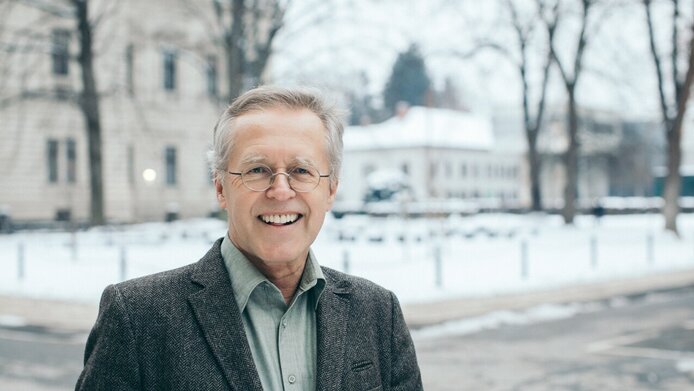“Never stop, always keep thinking things over”

Peter Holzer opens the big gate to the Institute of Experimental and Clinical Pharmacology in Graz. Emptiness reigns in the corridors and laboratories, it is the weekend. Although the 67-year-old scientist from Styria has actually retired, he has not stopped working. Not yet, at any rate. Thinking things through from new angles, building on previous results –, this is what the researcher lives for. Peter Holzer is considered a trendsetter in the field of neurogastroenterology, a research field which has shown that there is a close connection between the bowels and the brain. This was a taboo subject until not too long ago, but an increasing number of recent studies indicate that the intestines are not only important for the immune system, but also have an influence on mental health.
“What happens in the gut is also relevant for brain activity and vice versa. The so-called gut-brain axis fulfils a communicative task. There are many information channels in this axis: nerves, hormones, immune mediators and metabolites of the gut microbiota”, explains Holzer while showing me through the premises and happily answering lay questions. The father of two daughters is an approachable person, someone who takes up the thread of a conversation instead of cutting it off; someone who explains complex facts in a comprehensible way. Most importantly, he has remained very down to earth despite his successful career.
Countless distinctions
Peter Holzer studied biology and biochemistry at the Karl-Franzens-Universität in Graz. Having acquired his professorial qualification in neuropharmacology, he did research at the University Of California’s Department of Medicine, but finally returned to his roots in Graz – to the Institute of Experimental and Clinical Pharmacology, where he had already worked as an assistant during his student days, and where he now has his own office. The walls and shelves display innumerable awards he has received for his research on the neuronal regulation of intestinal functions and visceral pain. Which one is he particularly proud of? “The Masters Award from the American Gastroenterological Association was certainly one of the greatest honours”, he says and points to a photograph taken at the award ceremony in Los Angeles. In its vicinity one also finds the Grand Decoration of Honour for Services to the Republic of Austria, which was conferred on the professor in 2006. “But I also have fond memories of the Sandoz Prize for Medicine, which I received back in 1988 and which was quite highly regarded at the time. Once you have reached my age and look back, the awards you hold dearest are the ones you received while you were still young.”
Neurogastroenterology
Neurogastroenterology is a comparatively young field, which became truly established only in the 1990s. Peter Holzer was among the first to explore it extensively. What inspired him to do it? “Originally I studied intestinal motility, the nervous system in the intestinal wall muscles that promotes the digestive process. The issue was gaining increasing relevance because new messenger substances in the nervous system had been discovered. These neuropeptides were found in the brain and in the intestines.” Apart from that, he also explored mechanisms of pain. At that time, scientists had only just discovered the impact of the spicy ingredient in chili on nerve fibres that are sensitive to pain and heat. Holzer studied this impact in the gastrointestinal tract. Such was his passion in this field that he even became known as “Mr Capsaicin” during his time in the USA, as he recalls with evident amusement. And this is what he found: “Capsaicin does not attack the gastric mucosa, but improves its defence mechanisms by stimulating blood circulation. It can mitigate or take away pain.” And in this way, one thing led to another.
Irritable bowel syndrome
“One should never stop, but always continue thinking things over”, is Peter Holzer’s motto in life. “I turned to abdominal pain, and by studying irritable bowel syndrome (IBS) I arrived at the main topic of neuro gastroenterology.” While physicians are still not certain about the root causes of this illness, they have at least arrived at the consensus that it involves a dysfunction of gut-brain communication. The vagus nerve has an important role to play in the process. “In the past it was thought that the vagus was only responsible for the physiological regulation of digestion. Many of the nerves in the vagus run from the periphery up to the brain. There is a non-negligible emotional component. Being in pain for an extended period makes people suffer emotionally. Many IBS patients suffer from depression and anxiety.” This insight gave rise to the idea that psychiatric diseases might be caused inter alia by imbalances in the microbiota. Such imbalances may arise following infections and inflammation, but also in response to environmental factors such as unhealthy diets and certain medications. Stress hormones can also have an impact on the nerve cells and immune cells in the gut. In Holzer’s opinion, genetic factors play a minor role.
Behavioural changes
“Researchers observed changes in behaviour and cognitive restrictions in mice which had received stool implants from depressive patients”, notes the expert. He underlines that research is still in its infancy in this field despite such insights: “Interpreting the causal chains is still subject to limitations. It’s a classic chicken-and-egg problem. One must tread with caution and never abandon the principles of good scientific procedure.” While he is happy to see that science has meanwhile reached the prime-time news, he warns against exaggerated promises: “It is easy to be carried away by new ideas. One has to keep oneself in check and acknowledge the uncertainties that still exist.” This experienced researcher has seen many hypes come and go and frequently only reacts to sensational headlines with a tired smile. Are the almost weekly inquiries from the media sometimes becoming too much? “Well, yes. But we use public funds for our work and therefore have a duty to inform the public in such a way as to help them understand the situation.” That can also have side effects: “Whenever something comes up in the newspapers or on television, I receive emails. People send me pages and pages of medical history and ask to come and consult me. But I am not a doctor.”
Continuous funding by the FWF
Holzer has been receiving funding from the FWF since 1982. “A success story of which I am quite proud. Even at an early age I said that I wanted to be a researcher working as a small independent entrepreneur, and I have managed to do just that.” How does he assess the Austrian research scene? “When compared to countries such as Germany or Switzerland, basic research is underfunded. And when comparing the situation with the USA it strikes me that private sponsoring of basic research is underdeveloped. We don’t have that tradition here.” In his current stand-alone project – which he says will be his last – Peter Holzer explores issues relating to the immune system – an important information carrier of the gut-brain axis. How can the immune system change brain functions and behaviour? The complexity of the system makes it difficult to provide simple answers to concrete questions. This is the challenge of the future. “We want to gain insights that could offer new therapeutic approaches to issues like depression.” Peter Holzer always says “we”. Who is he talking about? “My research group. That is an important thing to emphasise. You don’t have an exclusive right to ideas. You implement them together with others in the lab.” Modesty raises its head again.
Aspiring to be a writer
Did he always want to be a scientist? “In secondary school I wanted to be a writer. It helps you in the scientific field if you like writing.” He is a critical reader of manuscripts by co-workers and doctoral students. “The corrected versions show a lot of colour. I always have to apologise for that”, he admits. As Dean of Doctoral Studies, Peter Holzer will not turn his back on science for some time to come. “There are many talented people who will get my continued support in terms of ideas. I like passing on the experience I have gathered.” One last question: where are the mice? “They are housed in a separate unit. But I am not allowed to take you there”, he laughs and opens the gate to say goodbye.
Peter Holzer is a professor emeritus of experimental neurogastroenterology at the Medical University of Graz. His research focus lies in intestinal motility, abdominal pain and connected neuro-psychiatric disorders. After studying biology and biochemistry in Graz and acquiring his professorial qualification there, he did research at the University of California’s Department of Medicine in Los Angeles. He returned to Graz in 1990. Apart from many other distinctions, Holzer received the Masters Award for Basic Research in Digestive Sciences of the American Gastroenterological Association and the Grand Decoration of Honour for Services to the Republic of Austria, both of which were conferred to him in 2006.
Related article






